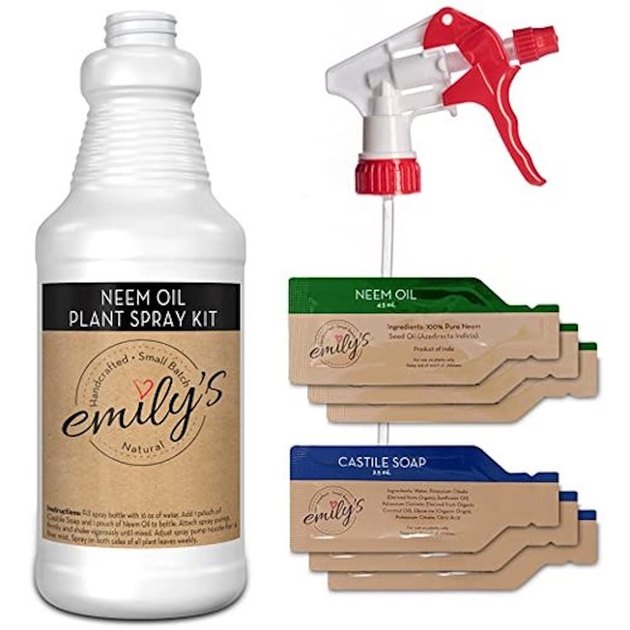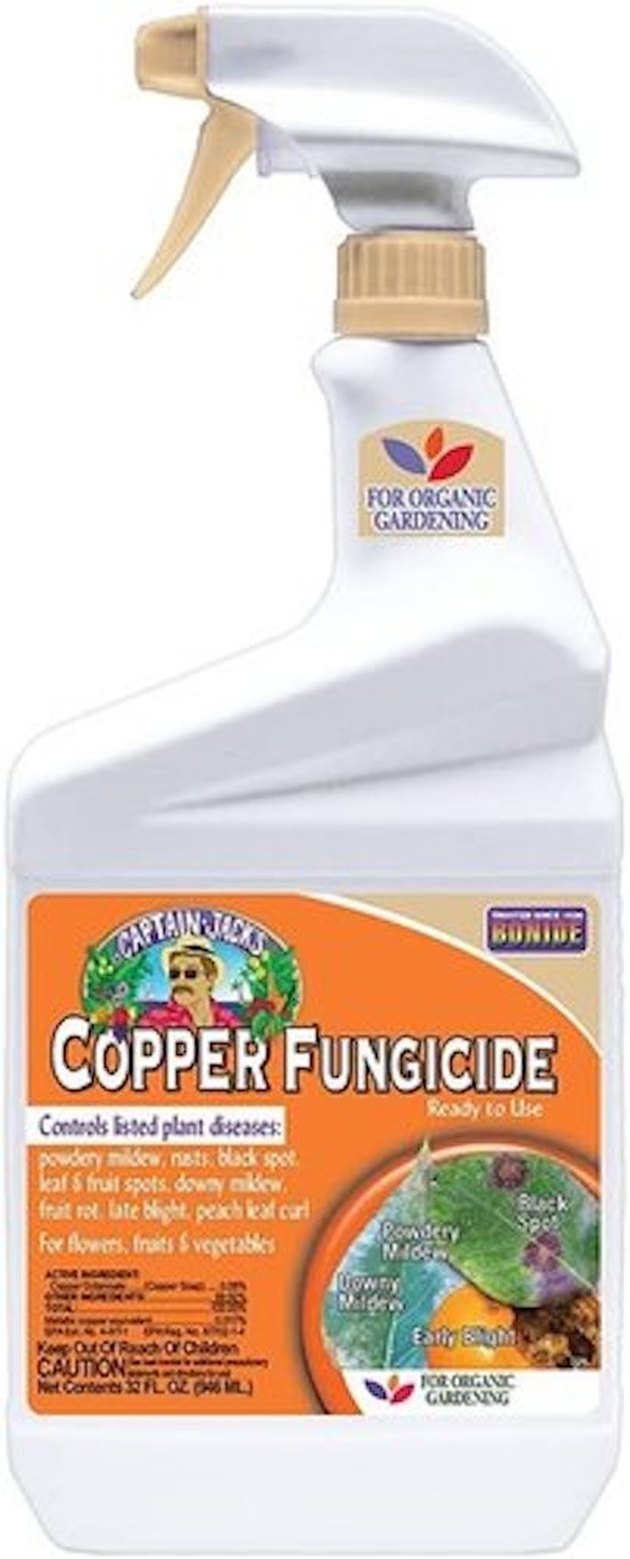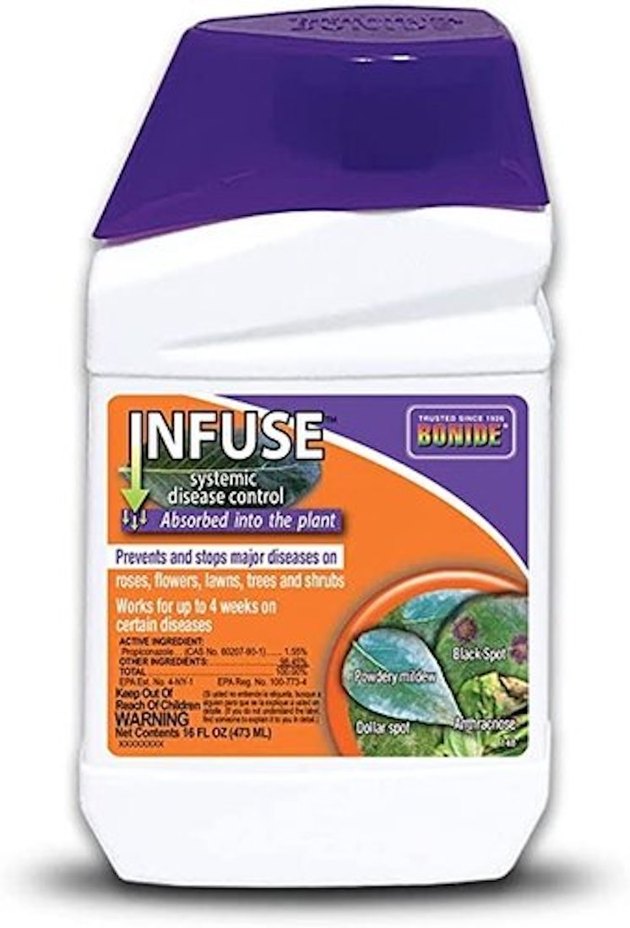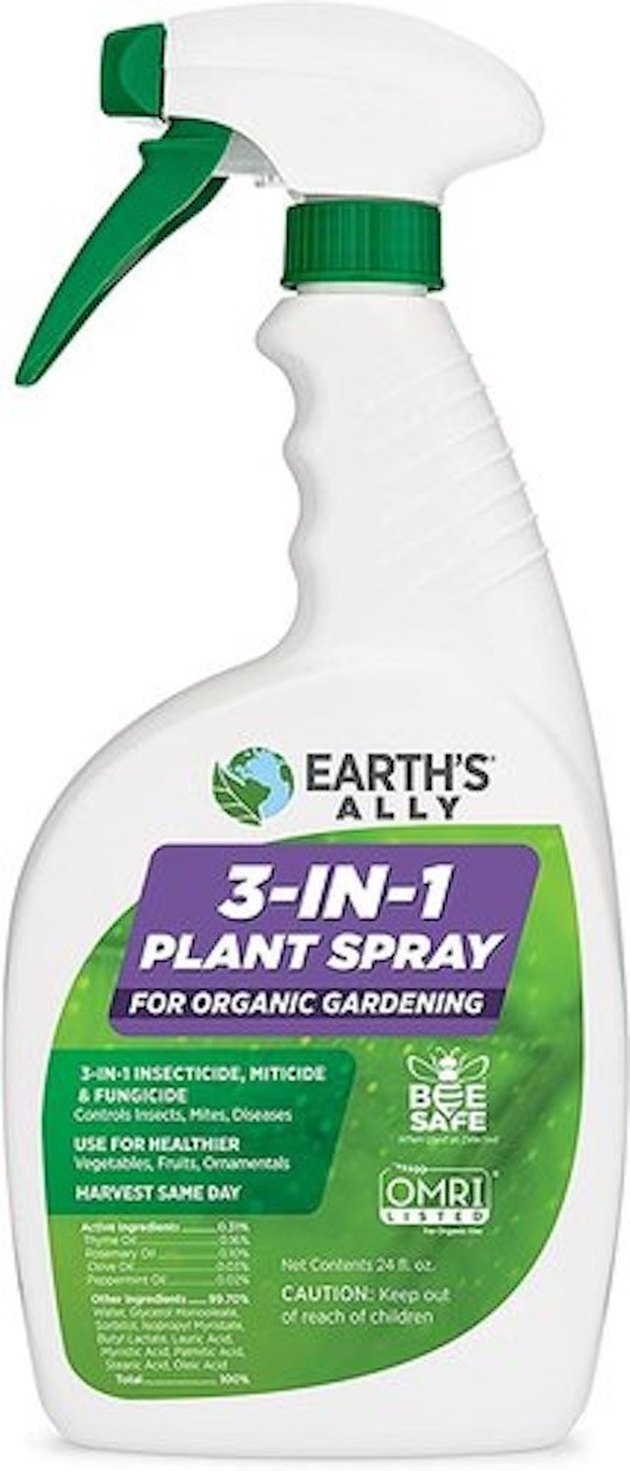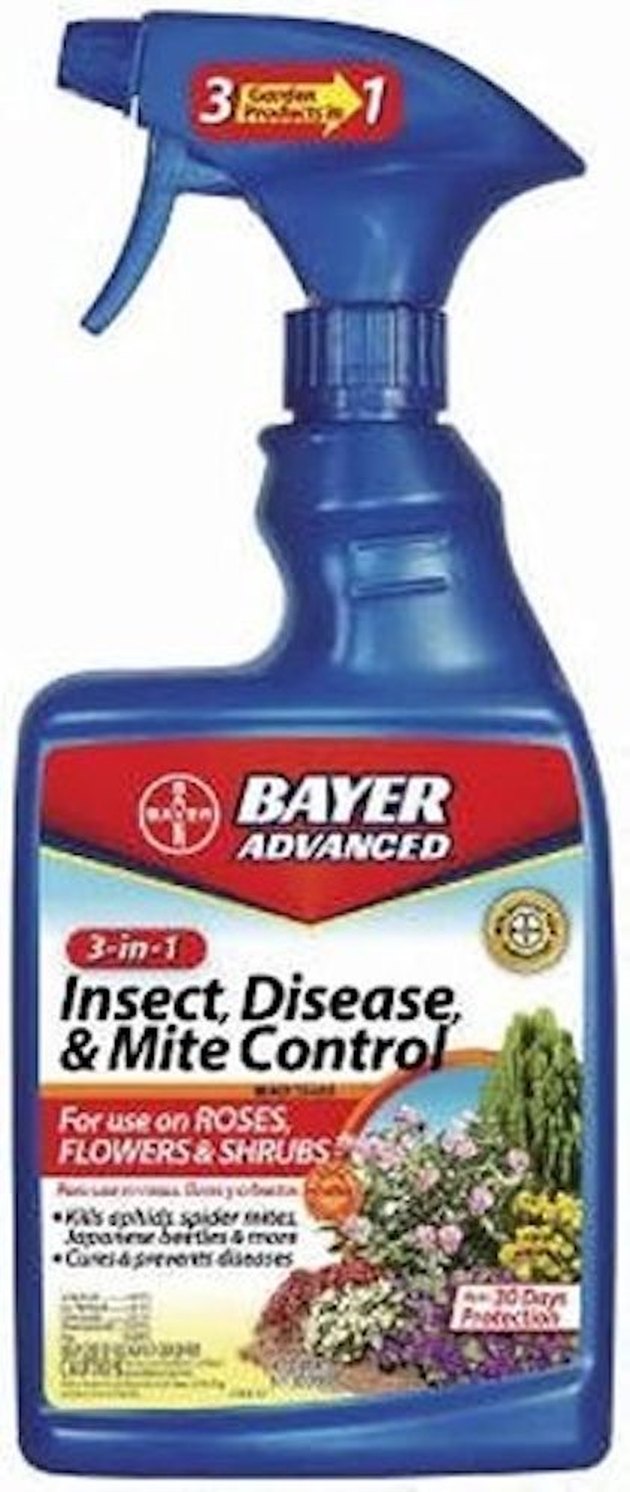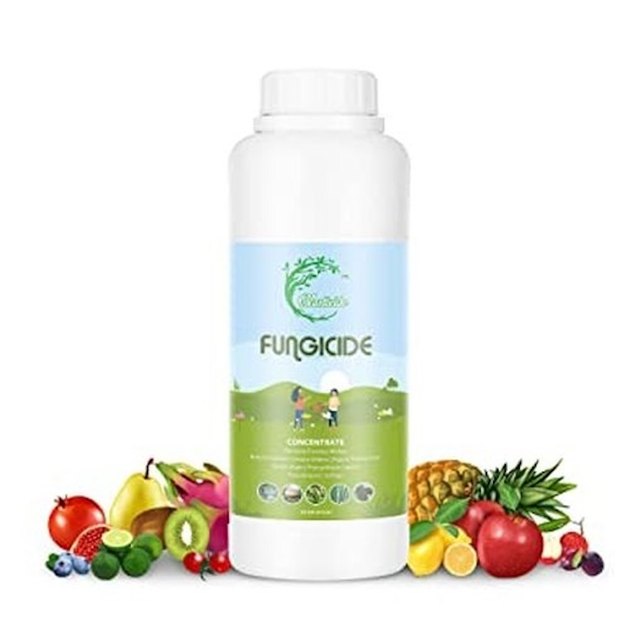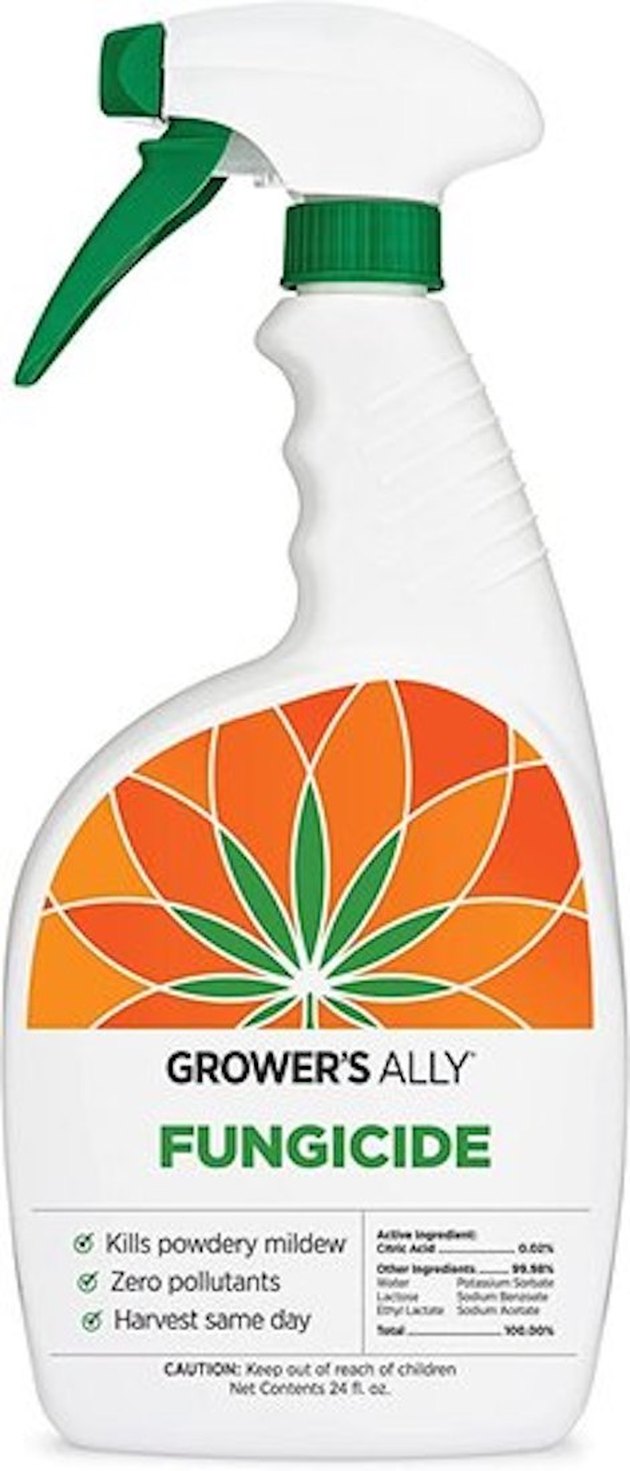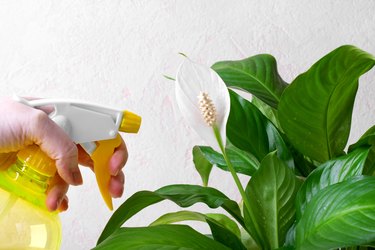
Filling our indoor spaces with the lush greenery of houseplants helps clean the air and adds a calming and relaxing feel, not to mention a bit of natural beauty. However, that beauty is tainted when those same indoor plants become infected with fungal diseases. Whether due to poor care or because the plant was infected when you purchased it, quick control of fungal disease is the best solution to stop the problem and save your plant.
Fungal infections are common houseplant diseases that affect indoor plants, especially if they aren't receiving appropriate care. When they don't receive good air circulation or overwatering keeps the soil too wet, fungal infections like leaf spot, gray mold, botrytis, downy mildew, black spot, powdery mildew and root rot cause havoc. Fortunately, you can offer your houseplants disease control and treat fungal infections by using a fungicide.
Video of the Day
Video of the Day
Below, we cover considerations when selecting the best fungicide and how to properly use it to treat plant diseases. We also note steps to preventing fungal disease before it rears its ugly head. Since there are various plant fungicides on the market, we've taken the hard work out of making a selection by covering some of the best on the market and their features.
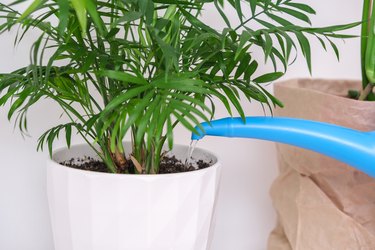
What to Consider When Selecting and Using Fungicides for Houseplants
Fungicide Types: Fungicides fall into two basic categories: penetrants and topicals. Topical fungicides, also known as contact fungicides and protectants function like a plant's raincoat. They prevent airborne fungal spores from infecting them. These fungicides work by forming a protective barrier on the plant and preventing fungal diseases from entering parts of the plant and damaging it. To work properly, these fungicides need to come into contact with infected parts of the plant and are used to treat plants already infected.
Penetrant fungicides, also called systemic fungicides, work through plant absorption, moving from the application site throughout the entire plant. Once treated, they stop the plant fungus from infecting new portions and they kill it, stopping further infection. These fungicides can prevent fungal infections as well as cure them.
How to Properly Use Fungicides: The first important consideration when using a fungicide is identifying the problem. So you know which type of fungicide is best, you'll first need to identify what the fungal problem is and what's causing the infestation. Once you've identified the plant fungus and selected the appropriate fungicide to treat the problem, read the label and follow all the instructions on its use. This not only protects the infected plant but also protects everyone in your home as well as the environment. The label notes the active ingredients, what fungal problems they treat, when and how much to apply and when to reapply. It also states what plants it's safe to use on.
Steps of Prevention: Sometimes fungal problems happen no matter how good of care the plant receives. However, sometimes the problems are preventable through changes in care. When purchasing a new houseplant, be sure to check it over for any signs of insect pests and diseases. Don't bring one into your house if the foliage shows signs of problems or you notice pests like aphids. However, if you accidentally purchase an infected plant or one of yours shows signs of fungal diseases, place it in quarantine away from the others so it doesn't infect them. Once treated and it shows signs of good health you can move it back with your other indoor plants.
Don't overwater your plants and be sure to use pots that have bottom drainage. This prevents the soil from being too wet which causes problems like root rot and other fungal problems. Give your plants good air circulation and if the soil has remained wet for too long, it's a good idea to repot your plants with fresh, clean soil. Knowing what your particular plant prefers for good growth goes a long way in keeping them producing healthy, robust and problem-free growth.
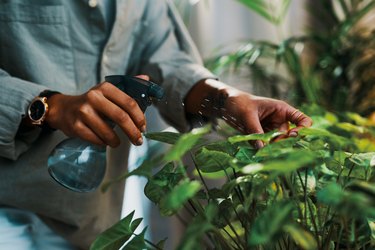
1. Emily's Naturals Neem Oil Plant Spray Kit
Emily's Naturals neem oil not only works as an organic fungicide but also as an insecticide; therefore, it offers double protection for your plants. It comes in a ready-to-use bottle so there's no mixing required. As a fungicide, it controls fungal diseases on your houseplants like rust, black spot, scab, powdery mildew, downy mildew, botrytis and more. As a pesticide, it kills bothersome pests like aphids, spider mites, beetles, fruit flies, whiteflies and midges, as well as many more. It's best to apply at the first signs of a fungal or insect problem and it's safe to use year-round. Just spray your infected plants with the neem oil, being sure to treat the underside of the foliage for complete control.
2. Captain Jack’s Liquid Copper Fungicide
Captain Jack's liquid copper fungicide is an organic fungicide that's safe for use on most houseplants. It comes in a ready-to-use formula so you don't have to mix the solution before using it. It's also safe to use on organic edibles up to the day of harvest. The copper fungicide treats fungal problems like leaf curl, powdery mildew, black spot, blight, downy mildew and more. You can use the product several weeks before fungal problems typically occur or when they show up on your indoor plants. Shake the bottle well and cover the plant with the fungicide being sure to cover the entire plant, including the underside of the leaves.
3. Bonide Infuse Systemic Disease Control
Bonide's Infuse Systemic Disease Control offers your plants systemic and broad-spectrum disease control. It comes in a concentrate so follow the directions for mixing and its application. It treats and prevents 30 fungal diseases, including leaf spot, rust, scab, powdery mildew and blight. The fungicide is absorbed through the plant and for some problems, it continues working for up to a month. As with all fungicidal products, using this systemic fungicide when you first notice a problem offers the best control.
4. Earth’s Ally 3-in-1 Plant Spray
This plant spray from Earth's Ally works to control three problems at once. The formula works as a fungicide, insecticide and miticide and comes ready to use. As an insecticide, it works to kill and repel pests like scale, aphids, mealybugs, whiteflies and thrips. The miticide works to kill and repel spider mites and two-spotted spider mites, and the fungicide prevents and controls leaf spot, blight, downy mildew, powdery mildew and canker. The formula is OMRI-listed, meaning it's suitable for organic gardening and contains peppermint oil, rosemary oil, clove oil and thyme oil. The product is safe for use around people and pets, as well as bees.
5. Bonide Sulfur Plant Fungicide
Bonide's Sulfur Plant Fungicide comes ready to use directly as a dust, or you can mix it with water and spray your plants. It's approved for organic gardening and is suitable for use up to the day of harvest. The fungicide works effectively against fungal problems like rust, powdery mildew and leaf spot and also works as an insecticide controlling pests like mites, thrips, scale and more. You can even use the powder directly on dogs to control fleas and ticks. When used in powder form, the extremely fine particles stick well to the surface of plants. However, you need to take your indoor plants outside to treat them if you plan to use the product as a dust.
6. BioAdvanced 3-in-1 Insect, Disease, and Mite Control
This 3-in-1 formula from BioAdvanced protects your houseplants in three ways. It works as a fungicide, miticide and insecticide and comes in a ready-to-use spray bottle so there's no mixing required. The fungicide controls and protects plants from fungal problems like leaf spot, anthracnose, black spot, scab, powdery mildew and rust. Some of the insect pests it controls and kills are aphids, beetles, mealybugs and thrips, to name a few. The miticide works by killing spider mites and two-spotted spider mites. The product offers systemic protection as it's taken in by the plant's roots and offers up to 30 days of protection to your indoor plants.
7. Nasticide Natural Fungicide
Don't let the product's name Nasticide fool you into thinking this is a toxic fungicide, as it's made from natural essential oils and is safe to use around people and pets. It's safe for use on all types of plants, including houseplants and contains concentrated soybean oil, clove oil and rosemary oil. It treats fungal problems like anthracnose, powdery mildew, downy mildew, sheath blight, botrytis and more. The fungicide is approved for organic gardening. Since it is a concentrated formula, it needs mixing with water before use. You only need two tablespoons per gallon of water and you then apply by putting it in a spray bottle and covering all parts of the plant.
8. Grower's Ally Fungicide Spray
This fungicide spray from Grower's Ally is a natural fungicide and bactericide that kills and prevents common plant pathogens from infesting your houseplants such as powdery mildew. It comes in a ready-to-use spray bottle and contains citric acid, which acts as a broad-spectrum fungicide. The spray is OMRI-listed and it's a good choice for organic gardeners who don't want to use toxic chemicals on their indoor plants or around children and pets. The citric acid forms a protective barrier on the foliage and prevents fungal growth. It's safe to use on your plants during all stages of their growth without fear of harming them.
